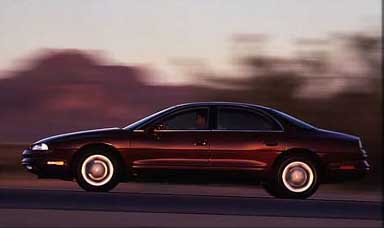You are using an out of date browser. It may not display this or other websites correctly.
You should upgrade or use an alternative browser.
You should upgrade or use an alternative browser.
Who killed the Electric Car?
- Thread starter spike
- Start date
Altron
Well-Known Member
spike said:What does an 1897 Olds look like?
Many car companies don't change every year. Really doesn't have anything to do with the point that the R&D for an electric car was already done.

The Oldsmobile Curved Dash, their first car.

The Oldsmobile Aurora.
Notice the lack of similarity.
You tellin' me that the RnD money they spent on the Curved Dash allowed them to make the Aurora without any additional RnD?
Altron
Well-Known Member
spike said:June 28th, 2006 (NY/LA). I'm pretty sure it wasn't. It's in theaters now.
http://movies.yahoo.com/movie/1809353030/info
Well, there was deffo some sort of conspiracy theory shit on TV, about the same time that you started the thread.
spike
New Member
Altron said:You tellin' me that the RnD money they spent on the Curved Dash allowed them to make the Aurora without any additional RnD?
No, I'm saying the RnD they did to make the electric car allowed them to make the electric car.
Had they let people renew their leases or actually purchase the cars they might have had more money for RnD.
Professur
Well-Known Member
spike said:No, I'm saying the RnD they did to make the electric car allowed them to make the electric car.
Had they let people renew their leases or actually purchase the cars they might have had more money for RnD.
Um ... no. The reasons for the lease only policy were clearly stated when the first electric cars came out.
1: It was new tech and they needed to make sure that only their authorized techs were messing with it.
2: If there was a recall, they needed to get them back in ASAP.
3: You've about 500 pounds of highly toxic material in each car. That can't just go to a scrap yard.
4: There's more money in leasing than buying.
5: 90% of the purchases were expected to be fleet (and were). Fleets prefer leases. It keeps the fleet in warranty (lowers the maintenance budget) and amortizes better. No residual value to clog up the books.
6: Electric cars have a shorter life cycle than gas. You only build the engine as heavy as you need for the period you want it to run. You could build an electric engine with a 100,000 hour life, but it would weigh twice as much as a comparable gas engine. You could make batteries to last 100,000 hours. But they'd weigh more than all the gas you'd put in a car for a year. Once these cars get close to the engineered end-of-life .... you get them the hell out of service .... before they die and ruin your reputation as a quality auto builder. Even gas cars today .... you can expect to replace 40% of the moving parts within 2 years of the first failure.
If there was money to be made (safely) in selling ... they would have.
spike
New Member
While much of that doesn't explain a lease only policy the rest doesn't explain not being able to renew the lease.
Damn, what kind of cars do you drive? I haven't had that kind of bad luck ever.
Even gas cars today .... you can expect to replace 40% of the moving parts within 2 years of the first failure.
Damn, what kind of cars do you drive? I haven't had that kind of bad luck ever.
chcr
Too cute for words
Professur said:If there was money to be made (safely) in selling ... they would have.

You'll note that as gas passes (pun not intended) three bucks a gallon the fly-by-night guys are coming out of the woodwork. You've been able to by an electric car or conversion kit with >40 mile range that won't go 50 mph for twenty five years. Guess what? You still can. Of course you have to buy a two to five thousand dollar battery pack every three or four years, but that gets conveniently forgotten in the media. Oh, and don't forget your parasitic 12V system for the AC, heater and lights. As I say, I'd love to have one to commute but I could never justify the extra expense.
Professur
Well-Known Member
Because the cars only have about another year's worth of driving in them (as explained above)spike said:While much of that doesn't explain a lease only policy the rest doesn't explain not being able to renew the lease.
Damn, what kind of cars do you drive? I haven't had that kind of bad luck ever.
What's so hard about reading the actual words I typed? I typed each one of them for a reason. The key word being "expect".
spike
New Member
They had some home-made alternative fuel vehicles on a show the other day. One of them was a truck that the guy had made run on used cooking oil.
The guy would stop buy restaruants and pick up the old oil from their deep fryers. People said his exhaust smelled like french fries.
The guy would stop buy restaruants and pick up the old oil from their deep fryers. People said his exhaust smelled like french fries.
spike
New Member
Professur said:Because the cars only have about another year's worth of driving in them (as explained above)
What's so hard about reading the actual words I typed? I typed each one of them for a reason. The key word being "expect".
I'm not sure that "another years worth of driving" is accurate. Where is that info?
I wouldn't "expect to replace 40% of the moving parts within 2 years of the first failure" at all. In fact I'd be pretty pissed.
Professur
Well-Known Member
chcr
Too cute for words
It's called biodiesel. It's been around since at least the mid-nineties. Kinky Freidman wants to run all the state vehicles on it if he's elected governor of Texas. Wille Nelson is trying to get a business going on it. Oh, and their not "home-made." They use existing diesel engines. You have to buy a lot of filtering equipment and there are additives involved, but I think it would eventually pay for itself. The engine conversion is fairly straightforward and not too expensive. Again, initial outlay and upkeep costs (filters in the filtering equipment have to be replaced fairly frequently and it doesn't burn as cleanly as petroleum diesel, a bunch of particulate pollution and residue in the engine) are the problem. I've seen a couple up close though, and they do smell like french fries.spike said:They had some home-made alternative fuel vehicles on a show the other day. One of them was a truck that the guy had made run on used cooking oil.
The guy would stop buy restaruants and pick up the old oil from their deep fryers. People said his exhaust smelled like french fries.
majestyx
New Member
spike, I don't think you READ and understood this sentence correctly.
He didn't say that you'd expect to replace the parts 2 years after you PURCHASED, but after the first part FAILED. And, I don't think he was including the standard maintenance items.
Unfortunately, I have to agree with him. Alot of today's cars are manufactured as 'throw away' vehicles. Pretty much because today's society has become a 'throw away' society.
Originally posted by Prof
you can expect to replace 40% of the moving parts within 2 years of the first failure.
He didn't say that you'd expect to replace the parts 2 years after you PURCHASED, but after the first part FAILED. And, I don't think he was including the standard maintenance items.
Unfortunately, I have to agree with him. Alot of today's cars are manufactured as 'throw away' vehicles. Pretty much because today's society has become a 'throw away' society.
Professur
Well-Known Member
chcr said:It's called biodiesel. It's been around since at least the mid-nineties. Kinky Freidman wants to run all the state vehicles on it if he's elected governor of Texas. Wille Nelson is trying to get a business going on it. Oh, and their not "home-made." They use existing diesel engines. You have to buy a lot of filtering equipment and there are additives involved, but I think it would eventually pay for itself. The engine conversion is fairly straightforward and not too expensive. Again, initial outlay and upkeep costs (filters in the filtering equipment have to be replaced fairly frequently and it doesn't burn as cleanly as petroleum diesel, a bunch of particulate pollution and residue in the engine) are the problem. I've seen a couple up close though, and they do smell like french fries.
The very first diesels ran, not on petroleum, but on peanut oil.
spike
New Member
majestyx said:spike, I don't think you READ and understood this sentence correctly.
He didn't say that you'd expect to replace the parts 2 years after you PURCHASED, but after the first part FAILED. And, I don't think he was including the standard maintenance items.
Unfortunately, I have to agree with him. Alot of today's cars are manufactured as 'throw away' vehicles. Pretty much because today's society has become a 'throw away' society.
No, I understood the "after the first part failed" part. It sounds like horrible cars to me.
I've got 2 vehicles now. One has 110,000 (bought new) miles on it. The other 175,000 (bought with about 105,000) and this has not been my experience at all. Nor was it my experience with with several cars before that.
When I owned cars built in the late 70's - mid 80's my car was in the shop a lot more but hell my car with 175,000 hasn't had anything but oil changes and brake jobs.
spike
New Member
chcr said:It's called biodiesel. It's been around since at least the mid-nineties. Kinky Freidman wants to run all the state vehicles on it if he's elected governor of Texas. Wille Nelson is trying to get a business going on it. Oh, and their not "home-made." They use existing diesel engines. You have to buy a lot of filtering equipment and there are additives involved, but I think it would eventually pay for itself. The engine conversion is fairly straightforward and not too expensive. Again, initial outlay and upkeep costs (filters in the filtering equipment have to be replaced fairly frequently and it doesn't burn as cleanly as petroleum diesel, a bunch of particulate pollution and residue in the engine) are the problem. I've seen a couple up close though, and they do smell like french fries.
That's pretty cool. I'm trying to imagine a city full of cars with french fry exhaust.

Inkara1
Well-Known Member
spike said:my car with 175,000 hasn't had anything but oil changes and brake jobs.
So that means the first major part hasn't failed yet, meaning that car is no point of reference as far as expecting 40 percent of the major parts to fail within two years of the first one.
spike
New Member
Inkara1 said:So that means the first major part hasn't failed yet, meaning that car is no point of reference as far as expecting 40 percent of the major parts to fail within two years of the first one.
Actually I have the service records from the original owner and it had a clutch and radiator replaced.
I've experience what Professuer was talking about with older cars. Especially an 80's Ford I had. 80,000 miles and everything was going wrong. Even the vents started falling out.
Seems like a lot of newer cars don't follow this trend *shrug




